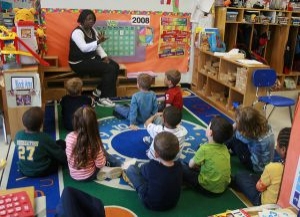

Your child is about to enter one of the most important parts of their lives... "School"! All children from the age of 5 (depending on your state and school requirements throughout Australia) begin school. It's an exciting time for both you and your child as you enter a new phase in life. For most parents the transition to school can be a little difficult and sad as they watch their little child enter a whole new world.
Television is not all bad. Sometimes it could be an excellent resource for education as well as entertainment. For instance, there are a lot of fun educational DVDs and TV programmes for children that could help develop their language development. Including, learning the alphabet, singing rhymes, music and movement and more. While school age kids can also learn about geography and culture, nature, wild-life, technology and heaps more. However, too much Television starts to become a habit and could get in the way of other important activities like physical activities, reading and writing, doing homework and spending time with family and friends.
You and your family are all sitting down at the table, enjoying a delicious meal. You look over at your child and instead of eating their food, they are playing with it. Not only that, they are chewing their food with their mouth open and burping loudly. Definitely not the table manners you were taught, when you were a child. Nevertheless, as your child begins to enjoy meals with the rest of the family, its time to start teaching your child table manners.
You just arrived home with your new baby and now you can begin the new chapter in your life as a two-child family. However, things aren't the same as before: your older child isn't used to sharing their attention from you with the new baby. All you have to do is help connect your older child with their new sibling with some thought, sensitivity and planning.
Internet is an important resource in today’s society for everyone and it has become a part of life just like mobile phones, Television, etc. There are also so many gadgets and devices you can use to surf the internet like laptops, mobile phones and even refrigerators! Internet is so useful now since there are so many things we can do. In fact it’s a lot faster and efficient, without even needing to go out. For instance -banking, shopping, pay bills, communicating with friends and families, make phone calls, search for information, directions & maps, research school reports, play interactive games and much more. The possibilities and the usage are limitless.
At times your child would not want to sleep at night. This can cause chaos as you try and get your child to go to bed and they just simply refuse. Your child can also start to get out of bed as soon as you leave the room or begin to wake up two or three times during the night. This is quite a common problem among children. It's important to deal with it as soon as it happens so your child understands that nights are for sleeping.
A consistent and stable routine is helpful for your baby, toddler or child's development. Having meals at regular times and fixed bedtimes each night, enables your child to structure their day and this contributes to your child's overall sense of security and well being.
As a parent, you will usually notice speech problems when trying to communicate with your child. When your child responds, you may have difficulty understanding what they are trying to convey.Symptoms such as, stuttering, mispronunciation of words, slurred speech or inability to speak are all part of speech delays.
As your baby becomes a toddler there are certain situations that, as a parent, you need to deal with. One of these situations is feeding problems. All of a sudden your child will become picky about what they eat. One of the most typical habits that begin to emerge is one day, your toddler is enjoying a particular food and then the next day for no reason, they reject the same food. Don’t worry… it’s not your cooking… it is all a part of growing up.
 Working as a childcare professional can be a challenge especially when dealing with behavioural problems which may arise. The techniques we use when dealing with… Read More
Working as a childcare professional can be a challenge especially when dealing with behavioural problems which may arise. The techniques we use when dealing with… Read More
 There are different types of behaviour that children can display and sometimes it can be hard to manage, especially if a child is having behavioural… Read More
There are different types of behaviour that children can display and sometimes it can be hard to manage, especially if a child is having behavioural… Read More
 As a parent, your behavioural expectations of your child can be higher than what is actually developmentally appropriate for your child's age.
Read More
As a parent, your behavioural expectations of your child can be higher than what is actually developmentally appropriate for your child's age.
Read More
 As Educators, there will be many instances where you will need to write about a child's behaviour. For a behaviour management plan, assessments, half-yearly or… Read More
As Educators, there will be many instances where you will need to write about a child's behaviour. For a behaviour management plan, assessments, half-yearly or… Read More
 As Educators when communicating with Parents (through verbal or non-verbal communication), there will be times where we need to discuss issues or concerns that may… Read More
As Educators when communicating with Parents (through verbal or non-verbal communication), there will be times where we need to discuss issues or concerns that may… Read More
 Challenging Behaviour is when a child does something that hurts themselves and/or other people.
Read More
Challenging Behaviour is when a child does something that hurts themselves and/or other people.
Read More
 As part of your child's development it is normal for your child to have anxiety and fears. A baby commonly shows a fearful sign to… Read More
As part of your child's development it is normal for your child to have anxiety and fears. A baby commonly shows a fearful sign to… Read More
 It's always difficult to bring up behavioural issues with parents, it can be nerve wrecking to tell a parent that their child misbehaves but that… Read More
It's always difficult to bring up behavioural issues with parents, it can be nerve wrecking to tell a parent that their child misbehaves but that… Read More
 All children deal with anger on a daily basis. Thinking about it as a child, there is a lot to be angry about. Elder people… Read More
All children deal with anger on a daily basis. Thinking about it as a child, there is a lot to be angry about. Elder people… Read More
 It is important to understand that your child behaviour problems could not just be from attention seeking. There are many factors to take into consideration… Read More
It is important to understand that your child behaviour problems could not just be from attention seeking. There are many factors to take into consideration… Read More

From when an infant is born the part of the brain that controls vital functions...
See more...
Here’s a breakdown of developmental milestones for children aged 2 to 3 years, along with...
See more...
Violence from a child in an early childhood setting can be confronting, destabilising, and emotionally...
See more...© 2009-2025 Aussie Childcare Network Pty Ltd. All Rights Reserved.

